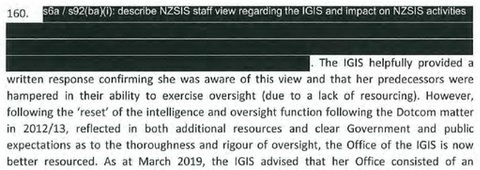(Section 6(a) of the OIA allows information to be withheld when release would "prejudice the security or defence of New Zealand or the international relations of the Government of New Zealand", though strictly speaking it does not apply to proactive releases like this).
But on the very next page, the Inspector-General tells us what those views are:
I'd thought that this might be a problem with older staff used to doing whatever they wanted pre-Intelligence and security Act, and having trouble making the adjustment to a tighter legal regime. But it turns out that its the opposite problem: on p128 the report says it is "particularly among newer or more junior staff". But further back, it says that SIS's staff has grown by 50% since 2017, on p49 it says a large number of new investigative staff were hire in 2018, and on p59 that at the time of the attacks, half of SIS's investigators had less than ones year's experience. In other words, the staff who distrust IGIS and feel that oversight "create[s] uncertainty, or impose[s] ambiguous or unworkable demands" were specifically trained within the new legal environment. And given their views of that environment, you really have to wonder about the quality of that training, and the attitudes their superiors are inculcating through it. Maybe that's something the Inspector-General should look into?

